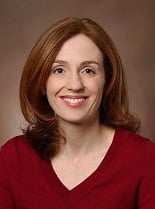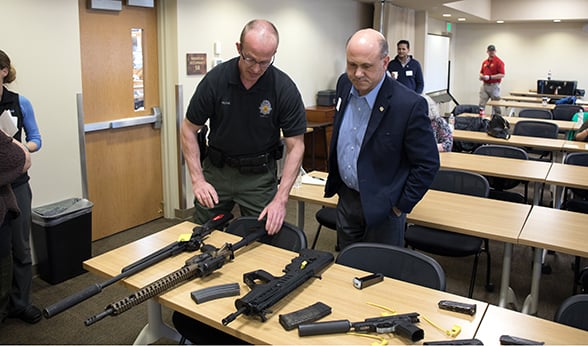A group of physicians handled a variety of firearms, and even emptied rounds into targets on a firing range, but they weren’t at the Centennial Gun Club to work on their marksmanship.
 Marian Betz, MD, associate professor of emergency medicine
Marian Betz, MD, associate professor of emergency medicine
Rather, the recent hands-on exercise was aimed at something else – fostering awareness of how and when emergency physicians can talk with patients in hopes of preventing future firearm injuries. The private training event, which included an overview of the epidemiology of U.S. firearm injuries and deaths, was sponsored by the University of Colorado School of Medicine’s Department of Emergency Medicine with faculty from the CU Anschutz Medical Campus and Denver Health Medical Center.
“As far as I know, this is the first time there’s been an in-person session for emergency physicians, bringing together education about how to talk to patients on this topic,” said Marian Betz, MD, associate professor of emergency medicine in the CU School of Medicine (SOM).
Fosters credibility
Vik Bebarta, MD, professor of emergency medicine and medical toxicology, said that besides increasing physicians’ familiarity with firearm vernacular and devices, the session covered options for safe storage and handling, as well as community resources.
[perfectpullquote align="left" bordertop="false" cite="" link="" color="" class="" size=""]'Three-quarters of firearm deaths in Colorado are suicide – not homicide, self-defense or mass shootings.' – Vik Bebarta, MD[/perfectpullquote]
“Because three-quarters of firearm deaths in Colorado are suicide – not homicide, self-defense or mass shootings – educating our physicians and community members is one approach to decrease these unnecessary deaths,” Bebarta said. “We think this is a first-in-the-U.S. event and a template for best practice regionally and nationally.”
Having knowledge of firearms gives physicians necessary credibility when discussing subjects such as trigger locks, safes and the role of police, added Bebarta, who is a prior active-duty military physician with several combat deployments.
Whitney Barrett, MD, an assistant professor in emergency medicine, said the event created a rare forum for emergency physicians, surgeons, police officers and violence-prevention professionals to discuss what guns mean to patients and “how we can use our unique position to potentially prevent future violence.”
 A Denver police officer, left, explains the differences of various firearms to Mike Pasquarella, assistant vice chancellor of the Office of Advancement at CU Anschutz.
A Denver police officer, left, explains the differences of various firearms to Mike Pasquarella, assistant vice chancellor of the Office of Advancement at CU Anschutz.
She enjoyed how the session encouraged physicians to ask questions and learn directly from local law-enforcement officials about the societal problem of gun violence. “It allowed us to set aside politics and think about patient care before shots are even fired,” Barrett said. “I think that everybody who participated in the event – from instructors to participants – left the training with at least one thing that will impact how they think about or do their job moving forward.”
Leading cause of injury and death
Betz said gun violence is a leading cause of death and injury in the United States – both from accidental and intentional use – and emergency physicians, often on the front line as first receivers, need skills in the education of patients and families on firearm safety.
[cucalloutbox align="right" color="" class="" size=""]
RESEARCHING GUN VIOLENCE
Firearm safety is a subject of strong interest to Marian Betz, MD, who is studying how to counsel suicidal adults and their families on methods of safe gun storage. The $800,000 study, funded by the National Institute of Mental Health, will examine whether such counseling-support approaches reduce suicide gun deaths.
[/cucalloutbox]
Physicians alone will not prevent all firearm injuries and deaths, Betz noted, and it’s not always appropriate for them to bring the topic up with patients. “But there are definitely situations where it is,” she said. “So I hope that after today these health care professionals will feel more comfortable and more excited about doing that – and realizing that they really can make a difference.”
Editor's note: Matthew Kaskavitch, digital engagement strategist for University Communications, contributed to this report.




